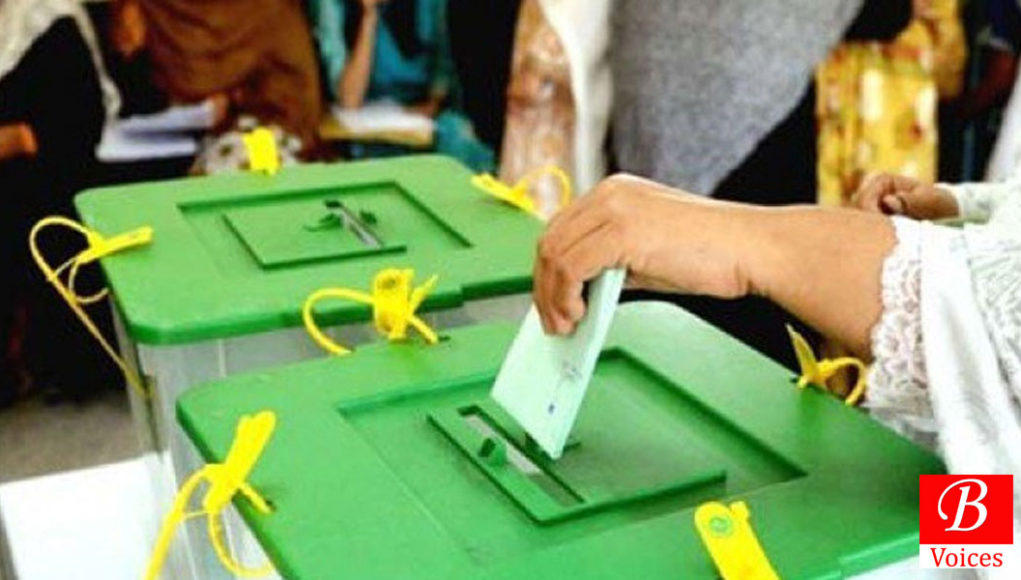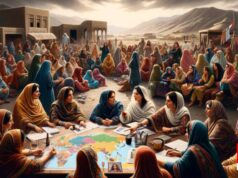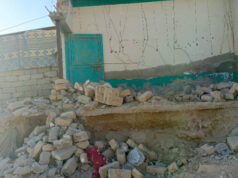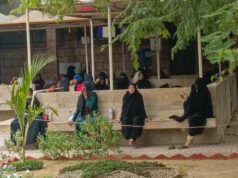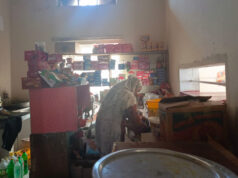Tahira Khan
Loralai, PB-5, lies in the northeast of Balochistan and shares borders with Ziarat, Sibi, Kohlu, Barkhan, Musakhail, Zhob, and Killa Saifullah. It has three sub tehsils i.e., Duki, Bori, and Mekhtar. Owing to the population size, the district has one Provincial and National assembly seat and lies at NA-258 constituency (Loralai-cum-Musakhail-cum-Ziarat-cum-Dhukki-cum-Harnai).
Following that, the population of the district is 397,423 with minorities including Christians, Hindus, Qadiani, scheduled castes, and others. As per the recent Pakistan Bureau of Statistics(PBS) Population survey, Muslims include 396016 while Hindus and Christians are 614 and 656 in number. However, the presence of Qadiani/Ahmadi and scheduled castes is minimal and does not constitute more than 150 members.
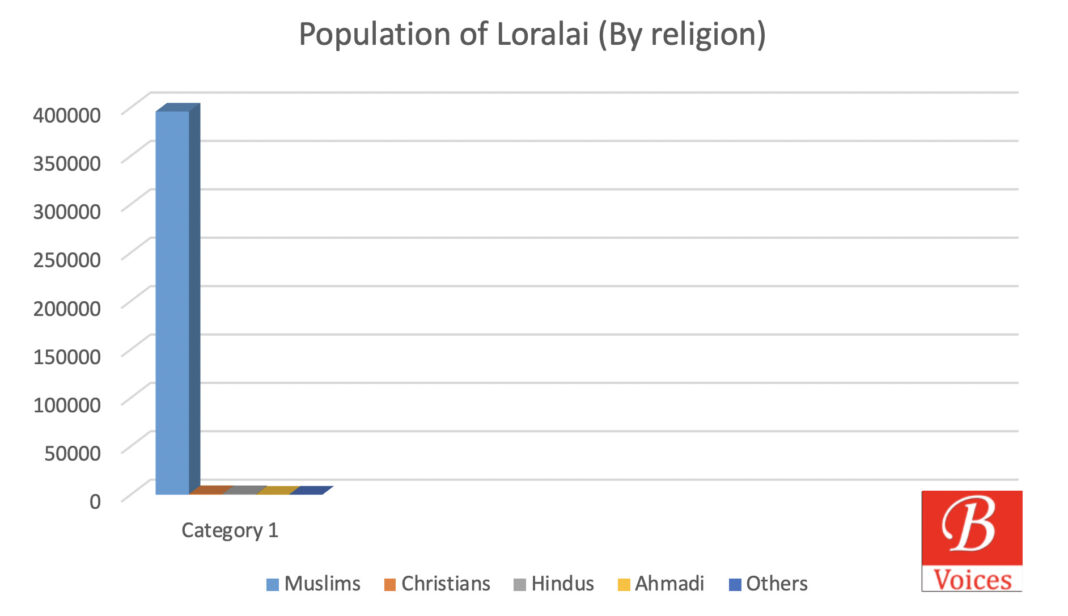
In this context, it is estimated that 99.64%population of the district is Muslim while minorities constitute 0.35% only if we consider the recent census conducted in Balochistan.
Chapter 2 of the Constitution of the Islamic Republic of Pakistan explains the composition of the Balochistan Assembly. It states that the total strength of the assembly would be 65 with only three reserved seats for Minorities. For the provincial assembly, the selection of minorities is based on the proportional representation of political parties.
Moreover, it also explains that contesting political parties would get minority seats in proportion to their general seats in the provincial assembly. If a party wins more general seats, it is expected to get more minority seats as well. This kind of election is indirect and minorities seem unsatisfied with the approach. Besides, these three members alone cannot represent the overall communal groups of Balochistan. In the last tenure, 2018-2023, the provincial assembly nominated Mr. Sham Lal from Lasbella, Mr. Khalil George, and Mr. Titus Johson from Quetta against the reserved seats.
In a research article titled “Empowerment of religious minority communities and Promotion of Understanding for Peace and Tolerance in Balochistan, Pakistan”, 2022, it is stated that religious minorities have suffered marginalization in the province since 1947. Unfortunately, the administrative setup has failed to safeguard political integration along with protecting the freedom of life, speech, and religion of minority groups. The report further details how political participation and integration of minorities are crucial to having an inclusive society in the province. In the context of Loralai, the political rights of the minorities are compromised because they have no representative in the provincial assembly and senate.
Narayan, Das runs a departmental store in Loralai. I approached him to know what he expects from the upcoming General Elections 2023. His words are as under;
“I have met many political leaders of the province and demanded to nominate a representative from our division as well. For the past 20 years, not a single member has been selected for reserved seats belonging to the Loralai-Zhob area.”
Das detailed the ordeal of minorities in political terms. According to his stance, keeping minority groups away from participating in political activities for over two decades has shrunk their minimal civil and political presence in the province.
He further continued;
“If a member is nominated from our constituency then he will work for our social, political, and economic rights. Moreover, we expect that funds will be allocated for the restoration of religious sites as well. There are four religious sites in Loralai i.e., St. Francis of Assissi Catholic Church of Godi Mohallah, Pentecostal Church of Katwi Morr, Hindu Mandir, and Balmik Mandir Loralai.”
Among these religious sites, Narayan Das is the focal person of the Hindu Mandir that is located at Hindu Mohallah, Kakari Masjid Loralai. He mentioned that this Mandir was constructed in 1865 and holds great religious significance for Hindus. However, the condition of the site needs restoration and it would be great if MPAs specify funds for the purpose.
Unfortunately, Narayan Das holds reservations regarding the existing electoral structure of Balochistan. According to him, candidates selected for reserved seats from other constituencies do not include them in their development agenda and projects. Furthermore, he also stated that they do not get jobs apart from the fact that the government has reserved quota for them. According to him, the minorities may get Grade 1 or 2 jobs i.e., the job of sweepers at various institutes. To meet their day-to-day needs, they run shops or other small businesses. Lastly, for the construction or restoration of their religious sites, Narayan remarked that they spend money from their pockets.
Besides, the participation of minorities in the education sector is also minimal. I surveyed the colleges and universities of the Loralai division and came out with the fact that not a single faculty member belongs to a minority group in both the college and university sectors. Besides, the enrollment of students is also not encouraged despite the fact that I have met many bright Hindu students. Simran is one such student who is studying Political Science at Degree College, Loralai.
In the context of minority marginalization, she remarked that for any democratic society, it is pertinent to safeguard the rights of minorities to avoid any conflict. However, in Balochistan, minorities are excluded from constitutional arrangements, electoral reforms, and the establishment of new governments. Consequently, a gap has developed within a society where minority communities feel marginalized and even threatened owing to their minimal civil and political presence.
Despite the fact that they are not represented in the government sector in education or police. Accordingly, I interviewed SHO Loralai, and Arif Batozai, about the recruitment of minorities in the Police department. He said that his department has started working on the concept of inclusivity and posts for minorities will be advertised in a month or so. Besides, he said that currently there is one female from the minority group who is serving the Loralai police while two more females are recommended and are awaiting clearance in the department.
Furthermore, if we analyze the performance of minorities during the last assembly session i.e., from August 2018 to August 2023, It can be seen that Khalil George along with Mahjabeen and Bushra Rind passed a private resolution to condemn the 5th September attack on FC personnel that martyred four FC personnel in Mastung. In the same vein, Titus participated in resolutions that included the exemption of domestic consumers of the province from the sale price formula, the arrest of culprits involved in acid attacks, and the retrieval of the Temple of Minorities. All these resolutions do not speak specifically regarding the problems of minorities of the NA-258 constituency except for the restoration of temples. On the other hand, regarding the funds for this project, Asad Paracha, another resident of Loralai, commented;
“When the government announces funds for any community or project, it is properly advertised via social media or mainstream newspapers. In retrospect, when it comes to minority groups, our funds are not advertised and are distributed at the whim of selected members. In this context, how can we make accountable our representatives?”
It is pertinent to state that the electoral system is a mechanism upon which the future of society sustains. The report titled “Electoral Systems and the Protection and Participation of minorities”, 2006, states that the electoral system is the backbone that decides both the marginalization and inclusivity of minority groups in countries including Pakistan. In addition to that, the electoral system also suggests how party leaders will deal with voters and consider their right to choose identity. Therefore, it can be said without doubt that Minority representation in the provincial assembly and local governance structure is the first step towards the inclusive nature of society. It also upholds the confidence of minority groups to actively participate in public affairs and realize their interests in society.
However, when it comes to Balochistan, the electoral system may have reserved seats for minorities but it does not engage a clear understanding of the situation of religious minorities and their geographical spread. It also does not incorporate the needs of society as a whole and the space required for minorities to practice their religion and rights. Overall, the system ignores the sensitivity where majority groups have to accept the inclusivity of minorities. In this regard, Adil Aziz, a member of the Christian community, said that available funds for the Loralai are minimal and, in the past, other politicians have also ignored the woes of minorities in the district. In the past tenure, funds allocated for the Loralai district minorities were used to build a porch in the graveyard of Hindus.
“What is the point of building a porch in Shaamshanghat knowing it can be used for the restoration of Mandirs in the city?”
Samina Hameed, a government servant, remarked that Balochistan is the tribal sphere but still communal differences can turn violent. In case of violent conflicts, the administrative structure of the province fails because it has never catered to the demands of the representatives of communal groups. Furthermore, the structure does not incorporate enough representation of communal groups in the legislative and executive corridors. She further reiterated;
“Can we manage or resolve the suppression of the Hazara community without giving them space in the legislative or executive branches? I guess not. The same is the case with Christians and Hindus.”
Additionally, Asad Paracha said that reserved seats for minorities should be increased.
Regrettably, electoral systems across the country, not just in Balochistan, have flaws that put minorities in a disadvantageous position. Major political parties do not provide a minority platform where they provide mechanisms or manifestos that directly speak of minorities. Similarly, MPs from minority communities are not found while the political dynamics of the country and the power devolution are decided. In this regard, Dr. Iftikhar H. Malik, Senior Lecturer at Bath Spa University College has explained the marginalization of religious minorities in a socio-cultural context and has written a report titled “Religious Minorities in Pakistan”. He explains the religious roots of our society are responsible for putting minorities at a disadvantaged stage and ignoring the Jinnah vision of an inclusive Pakistan.
Following that, Adnan Aamir, a political economy analyst, said minorities’ votes and their percentage do not matter because parties and electables can win without their support or votes. He also said having three reserved seats in the Provincial Assembly and four in the Senate can not lessen the woes of the minorities, especially due to the indirect method of elections. Minorities have no say about who will represent them and also because reserved seats are allocated on the whim of political parties and senate seats are decided at the National Assembly. Besides, he also remarked that minority politics in the province is symbolic and does not cater to the practical realities of the province. However, as far as their politicians are concerned, they also refrain from mobilizing minority communities because they do not have a stake at while doing all this.
Globally, different statutes are designed that manifest the rights of minorities in the decision-making process. However, international law does not include enough legal instruments that directly speak for or give a formula regarding the representation of minorities in the electoral system of any state. Therefore, major statutes have focused on the civil and political rights of minorities in general terms and not in electoral terms. In this context, OSCE guidelines to Assist National Minority Participation in the Electoral Process along with Articles 1, 2, and 4 of the United Nations Declaration on the Rights of Persons Belonging to National or Ethnic, Religious, and Minorities can be taken into consideration. OSCE guidelines are largely based on Lund’s Recommendation on Elections that states;
“Experience in Europe and elsewhere demonstrates the importance of the electoral process for facilitating the participation of minorities in the political sphere. States shall guarantee the right of persons belonging to national minorities to take part in the conduct of public affairs, including through the right to vote and stand for office without discrimination.”
In a nutshell, OSCE guidelines focus on the Individual rights to participate in elections and the prohibition against discrimination. Following that, the individual rights to participate in elections include the right to vote, regular and fair elections, and stand for public office along with freedom of assembly, association, expression, etc.
The writer holds an M.Phil Degree in South Asian Studies from the University of Punjab. She can be reached on Twitter @TahiraGhilzai.
Click here to read previous articles of the writer.
Share your comments!


